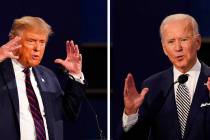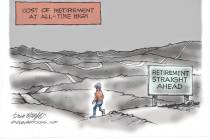On immigration, Trump is no GOP outlier
Any Republican Party attempt to rebuild after a loss by Donald Trump in the presidential election will be complicated by the fact that so much of the rest of the party shares his flawed view of immigration.
“Most illegal immigrants are lower-skilled workers with less education who compete directly against vulnerable American workers,” Trump said in the prepared text of his immigration speech in Phoenix.
This wasn’t some Trumpian departure from Republican orthodoxy; it is — unfortunately — a belief that is increasingly widespread among the party’s politicians and intellectuals.
The editor of National Review, Rich Lowry, who has been sharply critical of Trump, greeted the remarks with an approving tweet: “Trump makes absolutely correct point about overwhelmingly low-skilled immigrants and costs and effects of that.”
The second-place candidate to Trump in the primaries, Sen. Ted Cruz of Texas, had issued a campaign commercial on the topic featuring Cruz’s own comments from a debate. Said Cruz: “The politics of it would be very, very different if a bunch of lawyers or bankers were crossing the Rio Grande. Or if a bunch of people with journalism degrees were coming over and driving down the wages in the press, then we would see stories about the economic calamity that is befalling our nation.”
Cruz’s message, like Trump’s, was that immigrants were taking away jobs and driving down wages of American laborers.
This theme echoes in a soon-to-be released book by Edward Conard, “The Upside of Inequality: How Good Intentions Undermine The Middle Class.” Conard’s book is significant because he is a scholar at the American Enterprise Institute, a center-right establishment Washington think tank, and because he was a partner in Bain Capital with Mitt Romney, the former Massachusetts governor who was the 2012 Republican presidential nominee.
“The availability of low-wage immigrant workers puts downward pressure on low-skilled wages,” Conard writes in his new book.
When even Mitt Romney’s pal at the American Enterprise Institute is echoing Trump’s line of reasoning in blaming immigrants for the plight of American workers, it clarifies things. There’s something more serious and widespread going on here than merely a single unusual presidential candidate looking for an unpopular group on which to blame America’s economic problems.
I don’t find the “blame immigrants” argument convincing. As Jonathan Tepperman points out in another book coming out this month, “The Fix: How Nations Survive and Thrive in a World in Decline,” Canada has an immigration rate more than double that of the United States, and almost twice our percentage of foreign-born population, and it’s doing pretty well. If American workers weren’t competing with immigrants, they’d be competing with foreign workers overseas, or with robots or machines that can do their jobs. Out-of-work Americans have so many challenges — mental or physical disabilities or illnesses, addictions, staggering child-care or elder-care obligations, subpar educations, unstable family structures and nonexistent support networks, food and housing insecurity, lack of skills, perverse incentives created by welfare programs. Competition from immigrants is way far down the list.
If there is an advantage to hiring illegal immigrants, it is that doing so “under the table” allows an employer to escape a whole complex of taxes and regulations that would otherwise apply. The blame there belongs not to the immigrants but to the politicians who impose the taxes and regulations.
On economic policy in general, Republicans often attack zero-sum thinking. They argue instead that it’s better to grow the pie than to redistribute it. Somehow, on immigration, that approach is discarded, and immigrants, legal or illegal, are blamed for taking away jobs or lowering wages of native-born American workers.
There are ways to help struggling American workers other than building a wall to protect them from immigrant competition. Trump has talked about some of those methods — school choice, lower taxes — in the campaign. Finding more may be a job for the party’s candidate in 2020.
Ira Stoll is editor of FutureOfCapitalism.com and author of “JFK: Conservative.” His column appears Sunday.























